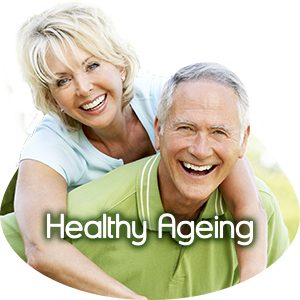
What is Healthy Ageing?
- Ageing simply refers to growing older. It starts from the moment of birth
- The term ‘healthy ageing’ refers to the ability to function physically, mentally, socially and emotionally as the body slows down its processes with rising age. It means remaining healthy and active in later stages of life too.
- Healthy ageing is also interchangeably used with ‘active ageing’ or ‘successful ageing’

- According to Healthy Ageing Project, co-founded by European Union, World Health Organization, different countries and other stakeholders, healthy ageing is “the process of optimizing opportunities for physical, social and mental health to enable older people to take an active part in society without discrimination and to enjoy an independent and good quality of life.”
- It can be also considered as a process of increasing opportunities for health, participation and security in order to improve the quality of life
- The goal of healthy ageing is to enable the elderly people to maintain good health at an elderly age
- Healthy ageing also refers to having a respectful and meaningful life
Status Quo of Ageing?
- With the demographic transition of population all over the world, % of elderly population is rising rapidly. Within only 10 years, there will be one billion older people worldwide.
- This rise in elderly population is more in developed countries compared to developing countries due to their better health services, higher quality of life and high life expectancy.
- However, even the developing countries are not far from this challenge. By 2050, nearly one in five people in developing countries will be over 60 years
- As elderly population is rising at a rapid rate, it is necessary to ensure that they (elderly ones) are having a better quality of life even at their old age.
What is the need of healthy Ageing?
- As mentioned above, more and more population of the world is ageing at a rapid rate.
- It is more often that elderly people do not have the best of their lifetime when they are at this age. This is because:
- They are usually retired/have left their job. So, their social circle and economic productivity is diminished
- Family members may view them as a burden and unproductive member in the family
- Limited mobility will make them feel socially excluded
- Frequent disease and health related complications will make them feel even worse
- Their physical, mental and cognitive development slows down and makes them more dependent on other people for different activities
- Therefore, there is urgent need of comprehensive public health actions to address this rising issue of healthy ageing in today’s world
10+ Strategies/ways to improve quality of life and ensure healthy ageing
- Promoting healthy lifestyle behaviors
- Regular health check-up, screening and increasing use of clinical preventive services
- Ensuring high quality acute and restorative care
- Eating healthy, nutritious diets and balanced diet rich in fiber, calcium and protein and low in cholesterol and fats
- Exercise regularly and reduce salt intake in diet
- Keeping mind active and challenge it regularly. E.g.: learning new languages, reading books, playing games like chess, learning music/dance etc
- Participating in activities that you enjoy
- Taking education on planning for serious illness
- Cultivating and strengthening relationships i.e. meeting and communicating regularly with family and friends
- Taking enough sleep around 7-9 hours
- Reduce stress through regular exercise, yoga, meditation etc
- Indulging in community actions like volunteering, being member of community clubs and regular activities etc
- Maintaining respectful life which fulfills physical, cultural and spiritual needs
To be more specific, researches have found that there are four key behaviors that ensure healthy ageing at a higher level. Each of these behavior individually also has noteworthy contribution for successful/healthy ageing. However, combination of all of them is supposed to increase the rate of healthy ageing by three times. These four behaviors are:
- No smoking
- Moderate drinking
- Regularly exercising (at least 2.5 hours a week of moderate activity)&
- Eating fruits and vegetables daily

Advantages of healthy ageing:
- Prevents disease and reduces illness
- Decreases use of health system and overall load on health care system, as elder population are the largest users of health care system
- Improves quality of life
- Decrease Disability Adjusted Life Years (DALY’s)
- Reduces dependency on other family members
- Increase in social and economic productivity
References and for more information:
http://www.euro.who.int/en/health-topics/Life-stages/healthy-ageing
http://www.who.int/ageing/events/world-report-2015-launch/en/
http://www.health.govt.nz/publication/healthy-ageing-strategy
http://www.rug.nl/research/healthy-ageing/programme-healty-ageing?lang=en
https://www.healthhub.sg/programmes/51/Healthy_Ageing
http://www.aihw.gov.au/ageing/older-australia-at-a-glance/healthy-ageing/
http://www.dartmouth-hitchcock.org/aging_resource_center/ten_tips_healthy_aging.html
http://www.everydayhealth.com/senior-health/understanding/index.aspx
https://www.nutrition.org.uk/healthyliving/healthyageing/top-tips-for-healthy-ageing.html
http://articles.mercola.com/sites/articles/archive/2012/12/10/healthy-aging-tips.aspx
http://www.who.int/ageing/active_ageing/en/
https://www.cdc.gov/aging/index.html
https://www.nia.nih.gov/health/featured/healthy-aging-longevity
https://medlineplus.gov/healthyaging.html
http://www.mayoclinic.org/healthy-lifestyle/healthy-aging/basics/healthy-aging-over-50/hlv-20049407
https://ec.europa.eu/health/ageing/policy_en
http://ajcn.nutrition.org/content/83/2/404S.full